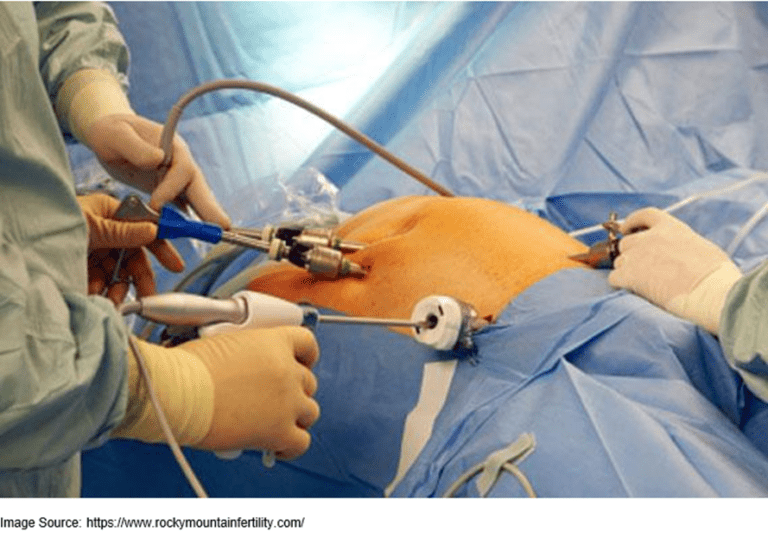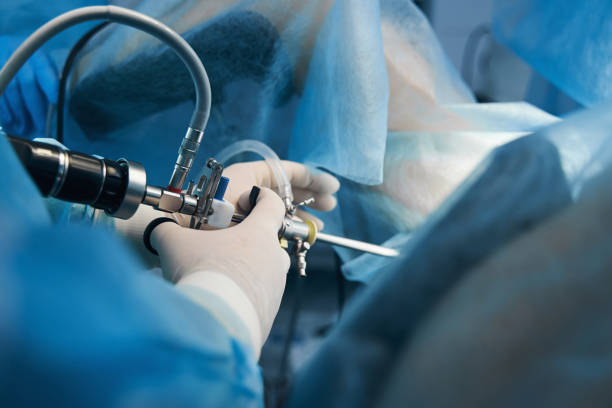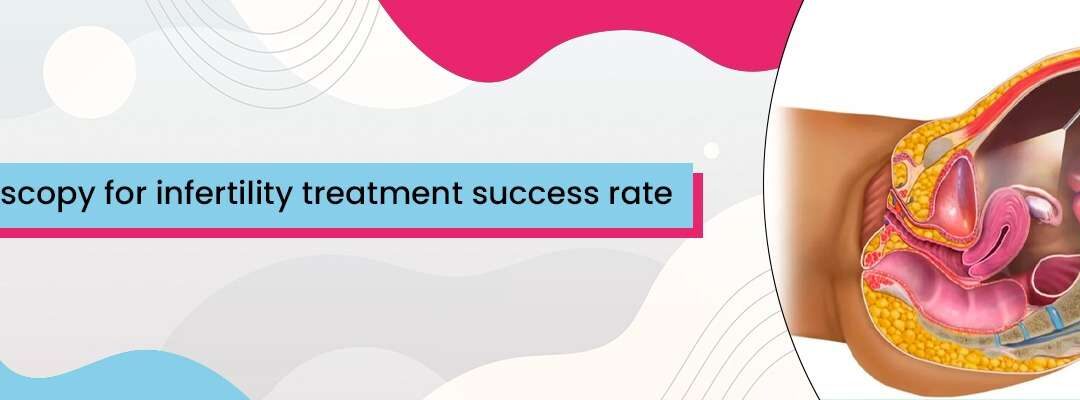Modern times have made our lives difficult and easy simultaneously. Where women find it more often than not difficult to conceive in these modern times due to their stress and other environmental factors such as their lifestyle, and sometimes, due to male infertility, medical science and technology has turned out to be a blessing.
After considerable tries at conceiving naturally, a woman finds herself visiting her gynaecologist for a fathomable explanation to her cause of infertility. And if you are on this page, it could very well be you or your partner, or someone close to you.

Most of us are aware of some standard methods of diagnosing any abnormality in our body – such as blood tests, X-rays, Ultrasound sonography, MRIs, CT scans, and also Laparoscopy.
Laparoscopy is frequently used to diagnose and treat various causes of infertility, such as endometriosis, hydrosalpinx, ovarian cyst, etc., by Dr. Mohit Saraogi at his IVF centre in Mumbai – Saraogi Hospital & Iris IVF centre.
Dr. Mohit Saraogi – a leading gynaecologist and IVF specialist, is proficient at conducting laparoscopy procedures in Mumbai. He explains the importance of the Laparoscopic procedure and its increasing success rate in treating infertility.
Laparoscopy procedure in brief:
A Laparoscope is an instrument designed to enter a human body through a small incision – as small as a centimetre. It has a source of light that improves the visibility of the internal organs through the camera attached to it. Your doctor can view your internal organs on the screen attached to the Laparoscope.
While your doctor is conducting the laparoscopic investigation of your internal organs, they can treat minor and sometimes even considerably bigger causes of your infertility by making a second incision and inserting another arm of the Laparoscope in it. Your doctor inserts micro instruments through this arm to treat and remove any abnormality found.
This procedure is conducted when you are under anaesthesia to prevent you from pain and discomfort.
Treating Infertility with Laparoscopy:
When your diagnostic tests for infertility have turned out to be inconclusive or demand further investigation, your doctor will usually recommend a laparoscopy procedure to get insights into the causes of your infertility.
Certain conditions of the woman’s reproductive organs can be diagnosed and simultaneously treated using Laparoscopy to improve your fertility and consecutively your chances of success at conception naturally or after an IVF procedure.
Your cause of infertility could be anything, including the ones listed below that are diagnosed and treated using Laparoscopy.

- Fibroids in the uterus cause blockage to the fallopian tube or distorting the path to the fallopian or distorting the endometrial lining. These can be successfully eliminated using Laparoscopy.
- Polyps or Endometrial Cysts can again be eliminated using Laparoscopy.
- Hydrosalpinx sometimes goes undetected in other tests. It is caused by infection or tubal block. The presence of a hydrosalpinx reduces the laparoscopy for infertility treatment success rate of an IVF procedure. Therefore it becomes mandatory to remove or clip the hydrosalpinx to increase your chances of laparoscopy and Ivf success rate.
- PCOD – polycystic ovarian disease can also be treated by laparoscopic drilling, thereby increasing ovulation.
- Adhesions are bands of scar tissue formed between the organs due to infections, injuries, or prior surgeries. These are inevitable as it is a part of healing. Although they seldom interfere with a person’s health, they can cause infertility. Laparoscopic Adhesiolysis is a process of minimising or removing these adhesions and thereby increasing your chances of fertility.
In addition to the conditions mentioned above, Laparoscopy is used to diagnose and treat many more causes of infertility and increases your chances of conceiving spontaneously.
Benefits of Laparoscopy:
Laparoscopy is most opted for compared to conventional open surgeries as it heals faster with minimum blood loss.
The formation of adhesions due to scarring is minimal, and therefore it will interfere less with your fertility.
The procedure itself takes very little time compared to open surgeries. They are completed almost 75% faster.
Most of the time, you will be fit to go home the same day, barring some extraordinary conditions.
Recovery after Laparoscopy for treating infertility
The obvious question that you are likely to have in your mind after the surgery is, how soon are you fit to try conceiving naturally?
Well, the answer is that it could take a couple of days to a few weeks depending upon the cause treated. A minor cause is treated faster with less invasion. Hence, you will heal more quickly as compared to a relatively more invasive procedure required to treat a major cause of infertility.

You need to keep a check on your incision healing. It takes a little more time to heal internally, so rest adequately before starting any form of physical activity, be it mild exercise or your attempt to conceive naturally.
If the pain persists after a considerable amount of time, you should revisit your gynaecologist for an immediate consultation.
Further treatment after Laparoscopy for infertility
That said, your gynaecologist will usually call you for a Hysterosalpingogram (HSG). In this procedure, the doctor will inject a dye through a catheter in your cervix, and X-rays are taken to look for any further blockages in your reproductive system.
If all is clear, you are ready for your IVF cycle. Laparoscopy for infertility treatment success rate increases the chances of success rates for IVF treatment by almost 70%.
Cost of Laparoscopy in Mumbai
The cost of a laparoscopy procedure varies depending on the hospital, the locality, your gynaecologist, and your condition treated. It could range very well between Rs. 50,000 to Rs.1 Lakh.
Conclusion:
Dr. Mohit Saraogi, an accomplished Gynaecologist and IVF specialist, gives hope to women trying to conceive either naturally or through an IVF procedure in Mumbai by conducting a thorough investigation using Laparoscopy for infertility issues and treats them at the same time if it is possible to treat the condition laparoscopically. The proficiency of the medical professional in performing IUI success rate after laparoscopy & IVF success rates after laparoscopy
Some reproductive conditions that can be treated laparoscopically are PCOD, Endometriosis, Fibroids, Polyps, Hydrosalpinx, and adhesions.
The recovery time is considerably less than conventional open surgeries, and you can attempt natural conception after almost a month or so – depending on the cause treated. Always keep a check on your incision while it is healing, and be aware of any pain during physical movement.
Alternatively, if you are ready for an IVF cycle, your doctor will plan it with and for you. A laparoscopy treatment for infertility increases your chances of conception by almost 70%, and the cost is a nominal amount of up to Rs 1 Lakh in Mumbai.
Chin Up, Ladies; there’s hope!!

